Top 12 Fun Facts About Sleep
Ideally, we spent one-third of our life sleeping. The 7-9 hours we should spend sleeping every day help our body to heal itself, activate the immune system, ... read more...and give our heart a break. However, people still have so many things they're unclear about sleep, and in this list, we'll show you some of the interesting facts about sleep that you might not know of.
-
According to the American Sleep Association (ASA), insomnia is the most common sleep disorder. In America, 10% of adults report having chronic trouble falling or staying asleep, while 30% report just short-term problems. A vast majority of us breathe through our mouths during sleep and this is what often causes us to experience disturbances and fail to achieve a good quality sleep. Sleep apnea, snoring, and waking up are some of the things that can occur as a result of mouth breathing. Therefore, there is an important relationship between sleeping and breathing, and many research shows that by concentrating on your breath, you may find it easier to fall asleep.
There are various techniques of breathing to help you fall asleep easier and maintain your sleep. These are thought to be the most practiced ones: 4-7-8 breathing technique (a modification of pranayama, a traditional yoga practice that helps relaxation while replenishing the body's supply of oxygen), Bhramari pranayama breathing exercise (a technique that reduces breathing and heart rate quickly), Three-part breathing exercise (helps you concentrate on the present moment and become aware of the feelings in your body), Diaphragmatic breathing exercise (slows your breathing and lowers the amount of oxygen you need), Buteyko breathing (allows you to regulate the speed and volume of your breathing), etc.
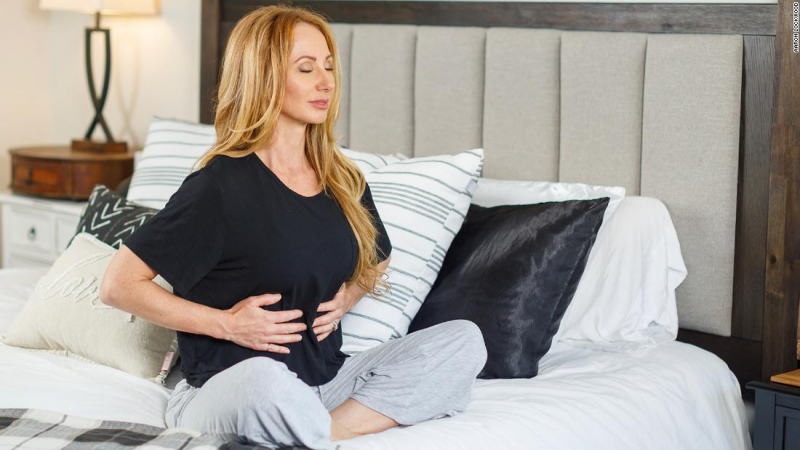
Photo: CNN Video: Oxygen Advantage -
It's no strange that having enough sleep and good quality sleep will benefit your body greatly, but do you know how much they could help your body? Studies have showed that an 8 hours of sleep will help you to maintain, or loose weight, since sleeping for less hours has been linked to a higher risk of weight gain and a lower body mass index (BMI). For instance, a lack of sleep results in higher ghrelin levels and decreased leptin levels. Two hormones, leptin and ghrelin, influence how hungry or full you feel. People could get more ravenous as a result and overeat. Additionally, due to their increased calorie content and ability to make up for a lack of energy, foods that are rich in sugar and fat may make you crave them when you are sleep deprived.
More importantly, sleeping well can also strengthen your heart. In fact, your risk of getting heart disease may rise if you have poor quality or insufficient sleep. Another study found that each hour less of sleep was associated with a 6% increased risk of heart disease and all-cause mortality when compared to 7 hours of sleep. Those who have obstructive sleep apnea, a condition that causes breathing pauses as you sleep, are likely to be more at risk for high blood pressure than those who get little sleep.
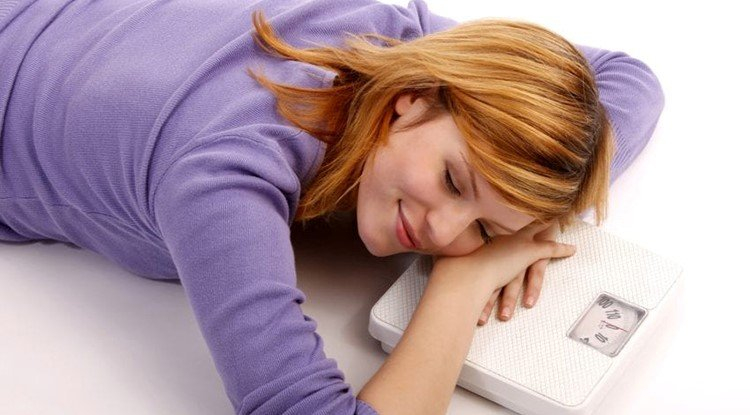
Photo: Squatgirl Video: Channel 4 Entertainment -
As said above, a good sleep will certainly make a good body. And therefore, not sleeping enough and poor sleep quality will increase the chances of getting various health issues. One of the most harmful that not getting enough sleep will get you is mental health issues such as depression. in fact, insomnia, or the difficulty of getting to sleep and staying asleep, is one of the typical symptoms of depression.
People with anxiety and depression were more likely to report having poorer sleep than those without these diseases, according to a study including 2,672 participants. Another study found that those with sleeping issues like insomnia or obstructive sleep apnea have higher rates of depression than people without such issues. If you have trouble sleeping and realize that your mental health has worsened, it's important to speak with a health professional.
The reason behind that is that insufficient sleep can significantly affect the body's inflammatory reaction. Sleep has a significant role in controlling the central nervous system. Two stress-response systems notably affected by it are the sympathetic nervous system and the hypothalamic-pituitary-adrenal (HPA) axis. It is well established that sleep disruption and sleep deprivation trigger inflammatory signaling pathways and raise levels of C-reactive protein and interleukin-6, two detrimental inflammation indicators. Chronic inflammation can eventually lead to the onset of a variety of chronic illnesses, including obesity, heart disease, some types of cancer, Alzheimer's disease, type 2 diabetes, and of course, depression.
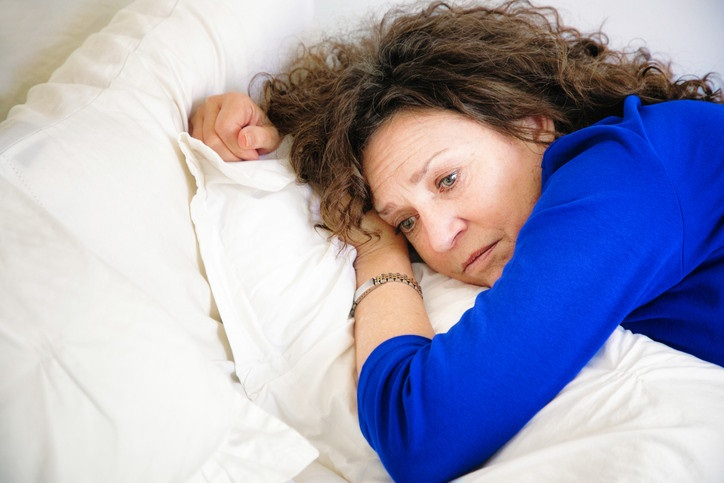
Photo: Harvard Health Video: TED-Ed -
Have you ever wondered if the foods you eat every day affect your body more than they are supposed to? Apparently, food and the time you consume them also affect your sleep. And you would be surprised to know that coffee or caffeine-related food, high glycemic index foods, Fast food, and other ultra-processed foods are not the only things that keep you awake at night. Spicy foods also have the same effect on your body, especially if you eat them before going to bed.
One potential contributor to sleep problems is the chemical capsaicin, which is contained in spicy foods. Your body temperature will naturally decrease as day turns towards night, and when you eat really spicy foods, such as chili peppers, your core, and surface body temperatures are somewhat boosted because capsaicin is thought to internally raise body temperature. Consequently, it becomes difficult to get a decent night's sleep.
Curry's distinctively spicy flavor makes it one of the worst foods for sleep. When you lie down to sleep, the symptoms brought on by spicy food like curry may get worse since the acid may enter the esophagus and aggravate it. Heartburn and acid reflux may result from this, disrupting your sleep and keeping you up at night.

Photo: Gleneagles Hospital Video: Insider Tech -
If you are surprised by this fun fact about sleep, you should be happy because this means your dreams are more colorful than others. Studies show that not everyone dreams entirely in color, and 12% of the population dream entirely in black and white. To find out the reason behind this, several studies have been done, but the most interesting one was a study that aimed to find out whether differences in the reported color of dreams can be attributed to the influence of black and white media or to methodological issues.
The study organized research in two age groups: a group of people that were born before color television was introduced, and a group of people who lived most of their lives watching only black and white television. The results of the analysis showed that there were no differences between diary and questionnaire measures of dream color and that persons who had access to black and white media before color media had more greyscale dreams than people who had none. Additionally, there were inter-group variations in the recall accuracy of both color and black-and-white dreams, which raises the idea that real greyscale dreams are unique to viewers of black-and-white media.

Photo: The Sleep Journey Video: KOOL 96.5 - Southern Idaho's Super Hits -
One of the most interesting myths that have been around for ages is that, eating cheese before bed can give you nightmares. This is due to the fact that many people did have a poor night’s sleep after eating cheese late at night. However, does cheese really has this effect on the human body, or is there some kind of connection between cheese, dreams, and nightmares? In a research done in 2005 by The British Cheese Board, participants were given a 3-ounce piece of cheese to eat right before bed. Then, a report was taken to record everyone's dreams and nightmares in an effort to look for any patterns. Different people were given various types of cheese.
The outcome of the research clearly proved that eating cheese before bedtime gives you nightmares is just an untrue myth. The majority of participants—an astonishing 75%—said they slept fairly well and had no nightmares. In addition, the majority of them said that they could clearly remember their dreams. This led researchers to the conclusion that tryptophan, an essential amino acid found in both milk and cheese, was having an impact on cheese eaters by regulating their sleep cycles and lowering stress levels. This means if you’re one of those people who want to have a good sleep and really want to dream more often, then cheese for supper might just do the trick.

Photo: University of Aberdeen Video: Liam Thompson -
Everyone dreams, and each and everyone has their own unique dreams, including people with disabilities. One particular thing about their dream is that they seem to use sign language in their dream, as there are many instances where people have reported their partners or children using sign language in their sleep. This might have been related to the fact that they are used to using sign language in their daily life because some people who’ve learned sign language also occasionally use it in their sleep. One good thing about this is that you can actually get an idea of what they are dreaming about by decoding their signs.
Moreover, studies show that people without hearing ability have more colorful dreams and a higher dream recall frequency. The Color, vividness, and spatial depth of their dreams are usually amplified. However, studies also point out that people who can't hear have a higher rate of nightmares and lucid dreams. Furthermore, taste, smell, pain, temperature, hope, anger, fear, and tense feelings were reported more often in their dreams. For people without visual ability, their dreams include all senses except for the visual sense.
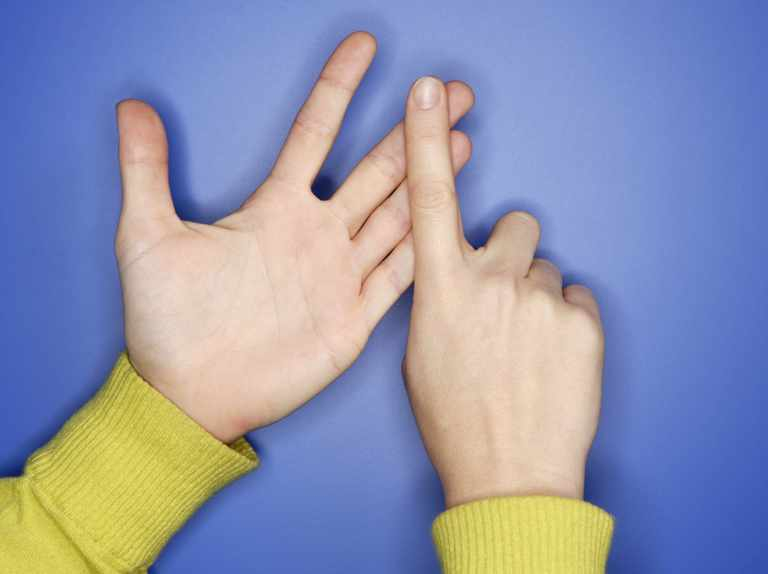
Photo: www.sciencefocus.com Video: Sign Duo -
Everyone must have experienced this - the sensation of falling when half asleep and jerking yourself awake. There are many names you can use to call this, including hypnagogic jerk, sleep start, sleep twitch, myoclonic jerk, or night start, etc. But this common phenomenon is mostly known as the "hypnic jerk". From a scientific perspective, this is a brief and sudden involuntary contraction of the muscles of the body which occurs when a person is beginning to fall asleep.
Around 70% of people experience them at least once in their lives with 10% experiencing them daily. Although the exact cause of hypnic jerks is unknown, they are thought to be completely normal. However, stress, caffeine, or physical activity right before bedtime may make them worse. They occur more frequently in young people and less frequently as we age.
There are techniques to lessen hypnic jerks, such as cutting back on stimulants like caffeine or nicotine, avoiding physical activity right before bed, and getting enough magnesium. The hypnic jerks may also be lessened or eliminated by some medications. For instance, using low-dose clonazepam before going to sleep may eventually cause the hypnic jerks to go away.

Photo: Sleep Foundation Video: SciShow -
Numerous research has been carried out to determine the relationship between our sleeping positions and our personalities by sleep psychologists and experts from around the world. And sleep science has played a significant role in demonstrating that your sleep patterns reveal personality traits such as neuroticism, conscientiousness, extraversion, agreeableness, and openness. Sleep researcher Samuel Dunkell writes in his book Sleep Positions, “The way we sleep is the way live”, and pointed out these four sleeping positions as in the picture below shows four different types of personalities.
If you sleep on your back, you love being the center of attention. You are a positive person who values the company of others who share your interests. People tend to notice your bold, powerful presence. You don't get involved in small conversations, things that don't live up to your expectations, or things that don't have your back.
If you sleep on one side, your sleeping position describes you as a peaceful, dependable, easy-going, busy, go-getter, and sociable butterfly person. You're constantly looking ahead, and don't look back with regret. No matter the circumstances or changes, you have a tremendous capacity for adaptation. You constantly search for the positive aspects of everything. Even when things are difficult, you never lose your smile.
If you sleep in the fetal position, then you long for safety and crave other people's compassion and understanding. You can disengage from the problems of the outside world. You are a reserved individual who does not readily open up. You're not very good at trusting people. They appear to be tough on the outside, yet they are actually quite sensitive.
If you like to sleep on your stomach, your sleeping personality describes you as a strong-willed, adventurous, risk-taker, high-spirited, problem-solving type of person. You are deemed capable of inspiring others or providing advice. You strongly prefer getting a full eight hours of sleep, if not more, to be awake and rested.
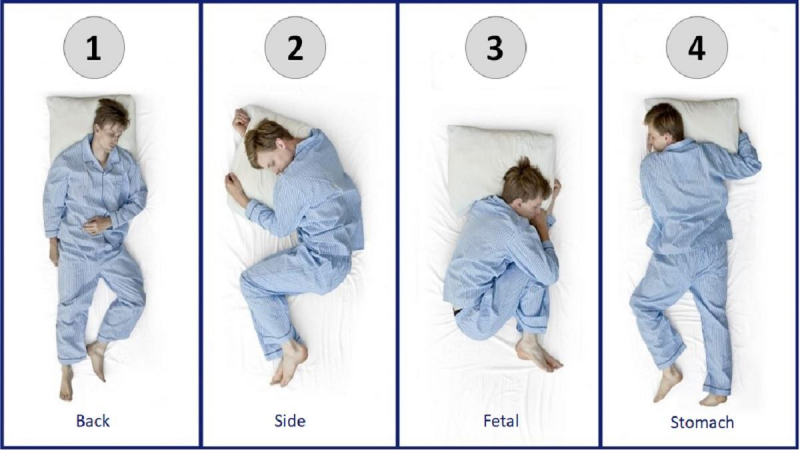
Photo: Jagran Josh Video: BRIGHT SIDE -
Whatever their preferred mode, animals including bats, elephants, frogs, honeybees, humans, and more all sleep. In actuality, no completely sleepless animal has yet been discovered. However, human beings seem to be the only one that can delay sleep. Very few animals will sleep on bare ground if given the option for a softer surface. Many animals make a bed out of leaves, tree boughs, grasses, and whatever happens to be around, but all of them will sleep when it's time for them to do so. It is because their bodies work that way by instinct, to give them the energy they need, and maintain their body temperature.
Human beings' bodies also know that by instinct, that's why we get sleepy at night or when we're tired. However, the human brain is more developed than that of other animals, therefore it can delay sleep to prioritize other activities at the moment. This way of function also has a side effect, which makes the human body work less efficiently and demands a make-up sleep. Interestingly enough, even though they always go to sleep on time, many species other than human beings find struggle with sleeping. There is proof that animals, including insects, can have insomnia. They often put on more weight, pick things up more slowly, and lose their balance, all of which are symptoms of sleep deprivation that humans can experience.

Photo: Keck Medicine of USC Video: VOA Learning English -
You might think that naptime after lunch is only for kindergarten kids, but many adults also feel like they could, and sometimes need a quick nap in the middle of the day after having lunch. In fact, in most Asian countries, taking a nap after lunch is considered normal and necessary for everyone, to the fact that even companies allow their employees to nap in the office after the lunch break. This phenomenon is actually a very normal one of the human body and is called "Post-lunch sleepiness". Unless you’re able to sleep in to get a full night’s sleep of 7-9 hours, even in the middle of the day, your body will tell you it’s tired. And a short nap, 20-30 minutes, is recommended for short-term alertness without feeling too groggy to get back to your day.
Besides being tired and not getting enough sleep, there are two other main reasons you may feel Post-lunch sleepiness. The first one is that when you eat, you trigger insulin, which means your blood sugars are going to rise. If you’re consuming carbs and sugar, you’re going to get tired because of the blood sugar effect. And the second reason is that you may have trouble digesting your food. The food may just sit there, making you feel bloated.

Photo: Indoindians.com Video: Dr. Eric Berg DC -
Do you ever want to talk about your sleeping experience but find it so struggling to express exactly what you have in mind? In that case, there are many words in the English language that perfectly describe different stages, and different phenomena related to sleep that you can use. These sleep-specific words might be able to help you at some points, only if the person you're talking to also knows about them, though.
These words include: Somniphobia - describing the fear of falling asleep; Oneirophobia - describing the fear of having nightmares or dreams while sleeping. In contrast to that word is Euneirophrenia - a word that describes the peace of mind that comes from having a beautiful dream. Moreover, there is Clinomania - a word to describe the irresistible urge to stay cozy in bed all day, and Dystonia - a word to describe that feeling when you’ve just woken up and really don’t want to get out of bed, etc. There are many other words that describe sleep you might find in the English language. If you can speak more than one language, it's great to compare these words with those in other languages and see how different countries have different thoughts about this action that takes 1/3 of our life.
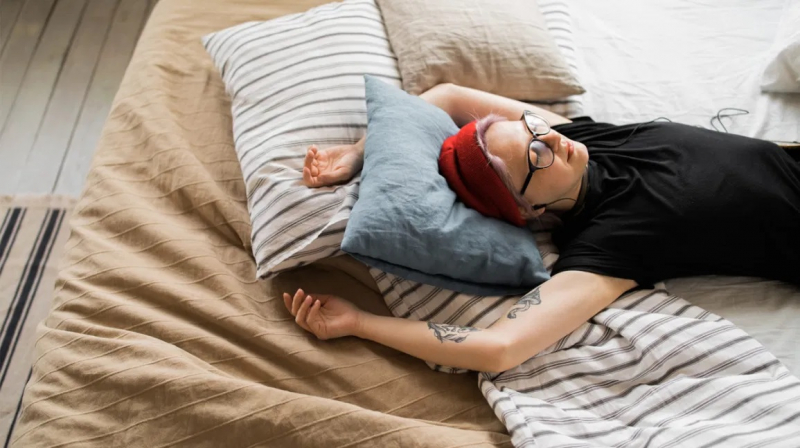
Photo: Healthline Video: Chuck DeBroder

































